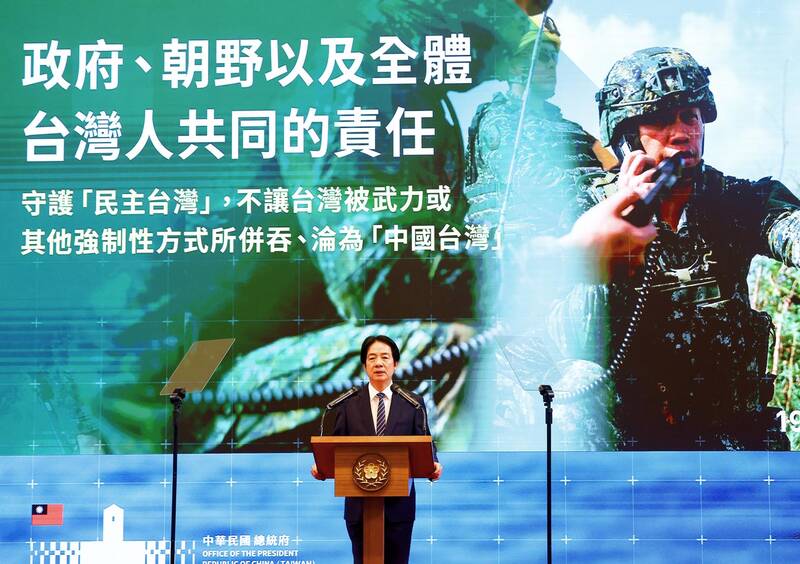President William Lai (賴清德) yesterday announced a NT$1.25 trillion (US$39.9 billion) special defense budget, which includes funding for a “Taiwan dome” air defense system with high-level detection and interception capabilities.
The funds would be allocated over eight years from next year to 2033, he told a news conference at the Presidential Office in Taipei.
Lai has previously pledged to increase defense spending to 5 percent of GDP as part of an ongoing strategy amid China’s threats of invasion.

President William Lai speaks at a news conference at the Presidential Office in Taipei yesterday.
Photo: CNA
“China’s threats to Taiwan and the Indo-Pacific region are escalating,” Lai said yesterday. “Recently, various types of military intrusions, as well as maritime gray zone and disinformation campaigns have been occurring in Japan, the Philippines and in the Taiwan Strait, causing deep unease and distress to all parties in the region.”
“Taiwan, as the most important and most critical part of the first island chain, must demonstrate its determination and take on a greater responsibility in self-defense,” he said.
As Taiwan faces calls from Washington to spend more on its own defense, mirroring US pressure on Europe, it plans to increase in its defense budget to 3.32 percent of GDP next year, allocating NT$949.5 billion, topping 3 percent of GDP for the first time since 2009.
Lai in August said that he hoped for a boost in defense spending to 5 percent of GDP by 2030.
US President Donald Trump has said that Taiwan should raise its defense spending to as much as 10 percent of GDP.
China has ramped up military and political pressure over the past five years to assert territorial claims.
History has proven that trying to compromise in the face of aggression brings nothing but “enslavement,” Lai said, adding: “There is no room for compromise on national security.”
“National sovereignty, and the core values of freedom and democracy are the very foundation of our nation,” he said.
Lai, who first announced the new spending plan of US$40 billion in an op-ed in the Washington Post on Tuesday, said that Taiwan was showing its determination to defend itself.
“It is a struggle between defending democratic Taiwan and refusing to submit to become ‘China’s Taiwan,’” rather than merely an ideological struggle or a dispute over “unification versus independence,” he said.
“My message is clear: Taiwan’s dedication to peace and stability is unwavering,” Lai said. “No country will be more determined in safeguarding Taiwan’s future.”
The government would focus on finding ways to increase its defense against Beijing’s “psychological warfare” as China attempts to “weaken our unity,” Lai said.
Mitigation efforts would include monitoring Chinese interference attempts during major events, including elections, and increasing public awareness of Beijing’s tactics, Lai said.
Special budgets supplement regular annual spending plans, providing funding for emergencies or projects that require years to complete.
Taiwan has previously used such funds to buy weapons systems, including fighter jets and missiles.
Minister of National Defense Wellington Koo (顧立雄) said that NT$1.25 trillion is an upper limit for the special budget.
The funds would be used to buy precision-strike missiles, as well as go toward joint development with and procurement from the US of equipment and systems, Koo said.
Lai in October announced that Taiwan would accelerate development of a comprehensive air defense system, dubbed T-Dome, that is expected to integrate domestically made and US-made weapons.
The special budget proposal is likely to face obstacles after Lai’s Cabinet formally proposes it, given that it requires the approval of the legislature, which is controlled by the opposition.
Lai also commented on a feud between China and Japan, which started when Japanese Prime Minister Sanae Takaichi said that a hypothetical Chinese attack on Taiwan could trigger Japanese military action.
Lai said that Takaichi’s comments appeared to be focused largely on stability in the region.
“We hope China can understand that each country in the Indo-Pacific region has a responsibility to its peace and stability,” he said. “We hope that China, as a major power in the region, would also demonstrate the responsibilities of a major power. Instead, it has continued to raise threats and attacks toward neighboring countries. This is not the way a responsible major power acts.”
Source: Taipei Times - 2025/11/27




















